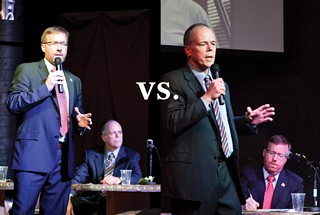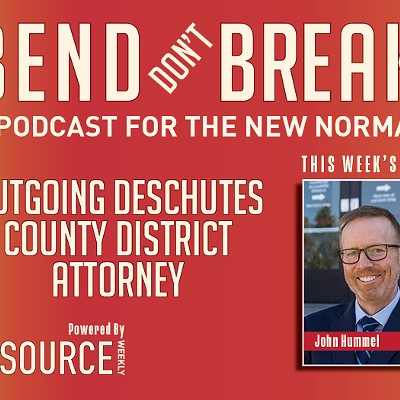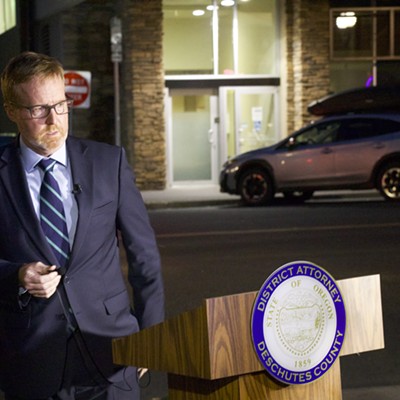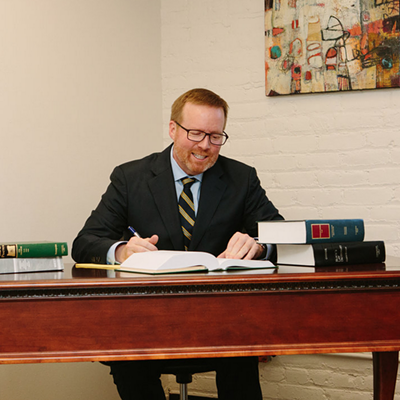Until Tuesday evening, the race for Deschutes County District Attorney—potentially the most interesting and probably the most important current race for office—had been largely silent. Still eight months away, the challenger John Hummel, a former defense attorney who has been campaigning since October, has been trying to pull the incumbent Patrick Flaherty into the ring, but with little avail.
A month ago, Flaherty rebuffed one invitation from City Club, quipping that he would mount a campaign as soon as "anyone qualified to be District Attorney files for election"—a gesture that only stoked more media interest in the race, and amped up local mythology about Flaherty's reported arrogance and aloofness. In part, though, passing on that debate seemed like a reasonable move for Flaherty, as the proposed moderator was an editor for the Bulletin, the newspaper that has publicly sparred with the DA since the first few months of his tenure, when Flaherty fired several attorneys in the office.
But on Tuesday evening, Flaherty finally did accept a challenge and stepped onto the stage at the Volcanic Theatre to debate Hummel, a forum moderated by three panelists— including the Source's Publisher, Aaron Switzer.
The setting, in fact, was an arrant metaphor for the entire event: More often a venue for bands and parties, the mood was jubilant (fitting, after all, for Fat Tuesday). About 200 attendees, almost exclusively Bend Chamber of Commerce members, sat on sofas and on bar stools facing the slightly raised stage, and the candidates were seated next to each other, both dressed in charcoal suits, cobalt blue shirt and patriotic ties.But anyone expecting a demur PBS-style, in-depth discussion of the issues about crime, prosecution and rehabilitative alternatives was soon dissuaded that this was anything more than alpha-males preening.
What did emerge early in the evening is that in spite of Flaherty's failure to mount much of a campaign yet—his current campaign account shows that he has raised all of zero dollars this calendar year, and is $8,100 in the hole—the incumbent is in it to win it. Early in the debate, Flaherty grabbed the microphone, stood up and strode to the front of the stage, pacing as he presented his answers. It was directly from the Bill Clinton playbook, and Hummel followed suit on his next answer. Had a silver back gorilla stepped onto stage and thumped his chest, he would have been in good company.
With beers in hand, the crowd murmured in appreciation at zingers and offered subdued gasps at insults—and, ultimately, what emerged was less a showcase of the mens' stances on issues, and more about their very different personalities, and which man you would rather have a beer with: Flaherty's Arnold Schwarzenegger or Hummel's Atticus Finch. Even the moderators seemed a bit uncertain about the depth of the issues. When Chamber of Commerce Director of Leadership & Government Affairs Jamie Christman, who was one of the three moderators, asked, "In your opinion, has Measure 11, the 'three strikes law,' had a positive or negative impact?," Flaherty rightly corrected her. "Those aren't the same thing," he explained. (Measure 11 was passed by voters in 1994, and provides mandatory guidelines to judges for sentencing in many felony crimes; whereas, the "three strikes law" was enacted in Washington in 1993 and California in 1994, and mandates life imprisonment for an offender on his third conviction.)
And, indeed, it is an important question. With two decades of evidence, Measure 11—like Three Strike laws across the country—has proven to be both expensive and ineffective at deterring crime. But the debate format, only allowing an opportunity for two-minute answers, and with media outlets wanting zingers more than analysis, did not provide latitude for the candidates to provide more than a hot or cold response. Even Hummel, who most categorize as progressive and who lists rehabilitative services (as opposed to Measure 11's throw-away-the-key attitude) as an important plank of his campaign, provided support on Tuesday evening for Measure 11.
In his closing statements, Hummel seemed to try and step even further into that I'm- tough-on-crime macho stance, singling out the case of Tony Martin, a 48-year-old man who was killed in 2011 as he pushed his bicycle across Third Avenue. In an apparent attempt to saddle Flaherty with his own Willie Horton (cross-reference: Michael Dukakis' 1988 President campaign), Hummel discussed what he considered a slap-on- the-wrist to a Les Schwab executive who had fatally hit-and-run Martin.
But ultimately, neither candidate emerged as a winner or loser (although one group of attendees standing in the back of the room, including elected officials among them, whispered that they were now looking for a third candidate). Instead, Tuesday's night event was round one of what will be a full 15-round battle. At the event's conclusion, it was announced that both candidates had agreed to attend a debate hosted by the League of Women Voters on April 15.
Yes, Round One is thankfully over—and hopefully both candidates and political watchers in the region can now settle into their seats for a longer and more dynamic exchange between these two men.Fittingly, as the Chamber of Commerce crowd moved out of the Volcanic Theater and into the darkening evening, attendees for the next event of the night began to fill in, including a man wearing a purple velvet suit and crown for the evening Mardi Gras party. It was hard to know when one circus ended, and the other began.




























